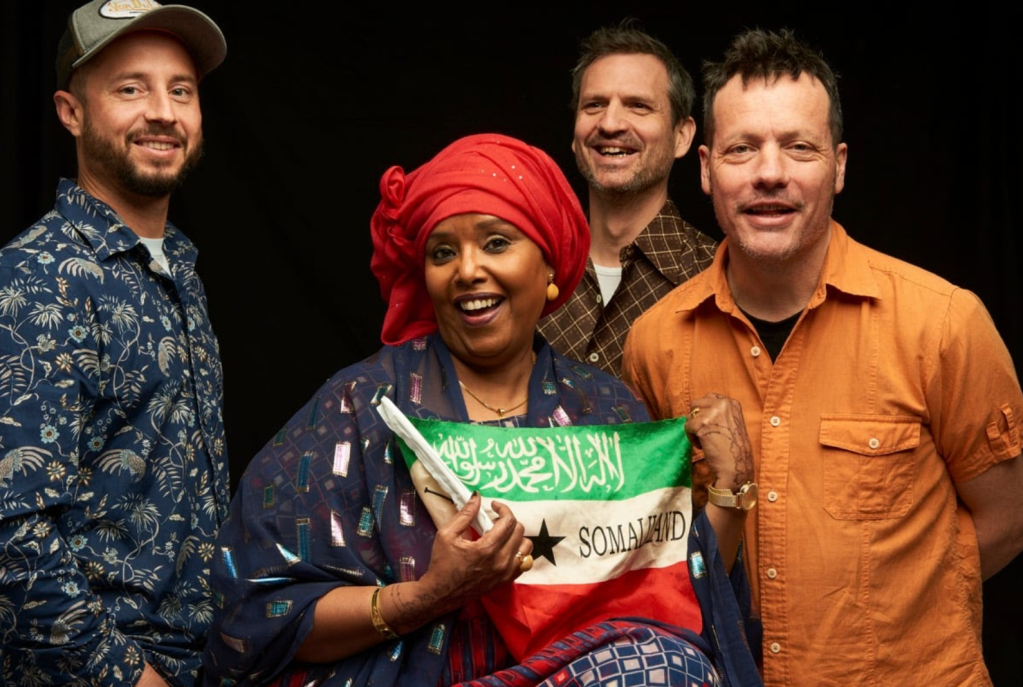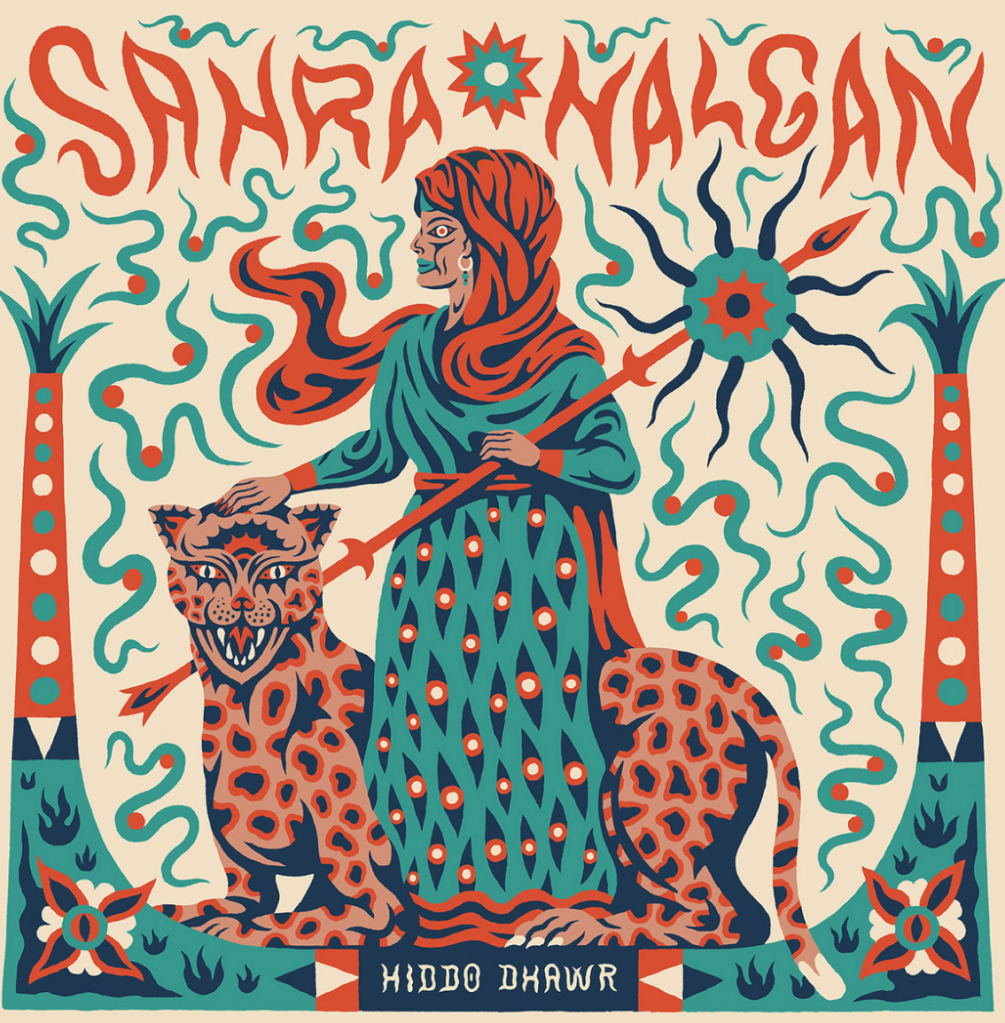Our Daily Bread 615: Sahra Halgan ‘Hiddo Dhawr’
March 26, 2024
ALBUM REVIEW: DOMINIC VALVONA

Sahra Halgan ‘Hiddo Dhawr’
(Danaya) 29th March 2024
Few artists from the disputed region of Somaliland could qualify better than the singer, freedom fighter and activist Shara Halgan to represent their country’s musical legacy. As an unofficial cultural ambassador and symbol for female empowerment Halgan’s journey is an inspiring one: Forced out of her homeland during a destructive civil war – in which she played a part in nursing and “comforting” fighters from Somaliland’s secession movement, sometimes alleviating suffering through song –, Halgan had to flee abroad to “survive” hardships and dislocation in France, but eventually, a decade after the overthrow of Siad Barre’s ruling military junta, returned home to motivate and promote proud in Somaliland’s cultural heritage.
It was during her time in France, removed from her roots and homesick, that Halgan would meet the musicians that went on to form her studio and touring band: step forward percussionist and founder of the French-Malian group BKO Quintet, Aymeric Krol, and the guitarist and member of the Swiss ensemble Orchestre Tout Puissant Marcel Duchamp and L’etrangleuse, Maël Salètes. Both appear on the latest, and third Halgan album, alongside newest recruit Régis Monte, who adds “vintage organ” and “proto-electronic embellishments” to the heady and fuzzed mix.
Before we go any further, a little insight, context is called for, as Halgan’s themes, messages are wrapped up in the history, turmoil and ambitions of this disputed region on the Horn of Africa. Firstly, Somaliland is an independent state within the greater scope of a troubled geography, neighbour’s to Somalia, Djibouti and Ethiopia. Going back to the 7th century, this land’s tribes were swept up in the great Islamic conversion, but by the 14th century, as power shifted between states and kingdoms, they came under the suzerainty of the, then, Christian Ethiopian Empire. Islam would always remain integral, through not only its teachings but poetry too. Fast-forward to the late 1800s and the arrival of the British, who established the troublesome protectorate of British Somaliland; joined in the region by the ambitions of Italy. Although this forced state lasted up until independence in 1960, there would be a number of rebellions and breakaway movements – most notably, the Dervish State revolt set up by Sayyid Mohamed and the poet Salihiyya Sufi in the late 1800s and early 1900s; a convoluted story that needs far more space and depth than I can offer, but that’s goals were to essentially reestablish the Sufi system of governance and independence; this period would eventually lead to the establishment of the state of Somalia, but also war amongst the colonial powers and neighbouring Ethiopia.
When independence did arrive in 1960, there was a brief blossoming for Somaliland, the “de jure” unrecognized breakaway part of Somali. Existing for a mere five years as a “sovereign entity”, it was gobbled up into the greater Republic of Somalia. But it is said that this fleeting state was economically and artistically fully independent and burgeoning before “internal tensions and violent repression” took its toll; leading later to the already mentioned civil war that kicked off in 1981, finally ending with the overthrow of Siad Barre and his military junta in 1991. Somaliland currently remains a fully functioning, near stable, state, one of the safest in the region despite all the turmoil and civil war over the border in Ethiopia, the turmoil of Somali and greater dangers of Islamic insurgencies, and now the extended crisis taking hold in the Middle East.

Since her return to the homeland in 2005, Halgan has helped nourish and cultivate a female-led scene by setting up the capital’s first music venue in the more tranquil surroundings of downtown Hargeisa – the once atavistic trading hub and watering hole for the local tribes, growing into a successful city over time, it’s also the de facto governing capital of Somaliland. The name of which, Hiddo Dhawr (which the PR notes translate literally as “promote culture”), now lends its name to this new album of eclectic fusions and Somaliland traditions. A hybrid if you will, Halgan and her group really open up to an abundance of influences and atmospheres whilst retaining the unmistakable sound of the environment and legacy; from the wild trills to griot storytelling poetics and general effortless sounding buoyancy and contoured sand dune rhythms and feel.
But first, the lead single and opening track, ‘Sharaf’ bounds in on a semi-garage, semi-Glam-rock and semi-swamp-boogie backbeat. A “love song and hymn to the importance of human dignity”, this electrified, fuzzy scuzz guitar licked desert rocker has both afflatus and loving intentions; Halgan’s voice nothing but lifting and softly commanding. By the second track, ‘Laga’, a “tender love song” is transported to both Egypt and Bamako in Mali, via the organ prods and radiant suffused keys of both Question Mark and the Mysterians and Hailu Mergia.
Melodious examples of the “modern style” of Qaraami can be found transformed on bluesy and wrangled dirty guitar, trinket jingling, and rocking accompanied title-track, and the soul-beat, hand-clapped giddy ‘Diiyoohidii’. Whilst that age-old form’s subject matter is love, Halgan replaces it with a love for her people, the culture and fertile land itself. Both are beautifully, emotionally conveyed, with a semblance of both pop and rock ‘n’ roll – I’m hearing both The Artic Monkeys and Dirt Music with a touch of Les Amazones d’Afrique.
Some songs change vocally between the lyrical and the narrated, or the spoken. ‘Lilalaw’ features the later, an address to a near two-tone beat fusion of the spacy desert trance, twirled and trundled African percussion and swamp blues pedals fuzz. The finale, ‘Dareen’, is almost entirely stripped back to allow a longing unimpeded curtain call from Halgan; only the suffused subtle keys of a Muscle Shoals-like organ across the swept vistas is needed. Talking of atmospheres, the Malian blues and dried bones and beads shaken ‘Hooyalay’ features cosmic desolation and misty mysterious vibes and winds, making it the album’s most experimental song.
Enriched soul music with a edge and buzz, Halgan and her troupe strike a balance between the heartfelt and empowered on electrifying album; that focal voice sounding so fresh and young yet wise and experienced, able to encapsulate a whole culture whilst moving forward.